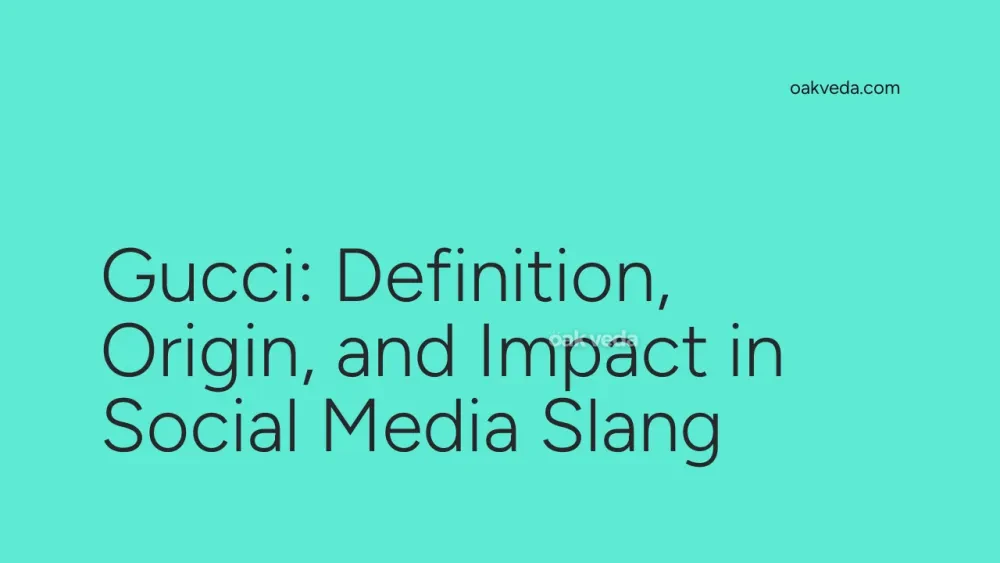
What is "Gucci" in Social Media Slang?
In the ever-evolving landscape of social media language, "gucci" has emerged as a popular slang term. Far removed from its origins as a luxury fashion brand, "gucci" now serves as a versatile expression of approval, satisfaction, or excellence in online conversations.
Origin and Development of "Gucci" as Slang
The term "gucci" originated from the Italian luxury fashion house Gucci, founded in 1921. However, its journey from high-end fashion to everyday slang is a testament to the dynamic nature of language in the digital age.
The transformation began in the early 2000s when hip-hop artists started using luxury brand names in their lyrics to signify wealth and status. "Gucci" became synonymous with quality and desirability. Over time, this association evolved, and the term detached from its brand-specific meaning, becoming a general expression of approval.
How "Gucci" Works in Social Media Communication
In social media contexts, "gucci" functions as an adjective or interjection, often replacing words like "good," "great," or "excellent." Its usage is casual and versatile, fitting seamlessly into various online conversations.
Examples of usage:
- "How's your day going?" "It's all gucci!"
- "That new song is totally gucci."
- "We're gucci to go whenever you're ready."
Popular Examples of "Gucci" in Social Media
The term has gained significant traction across various social media platforms:
- Twitter: Users often tweet "It's gucci" to indicate that everything is fine or under control.
- Instagram: Captions featuring "gucci" are common, especially in posts showcasing positive experiences or new acquisitions.
- TikTok: The term frequently appears in video captions and comments, particularly in content related to fashion, lifestyle, or general positivity.
Impact of "Gucci" on Social Media Culture
The widespread adoption of "gucci" in social media slang reflects broader trends in online communication:
- Linguistic Innovation: It demonstrates how language evolves rapidly in digital spaces, with brand names transforming into versatile expressions.
- Cultural Fusion: The term's journey from high fashion to everyday slang highlights the blending of different cultural elements in online discourse.
- Generational Markers: Usage of "gucci" often serves as a generational identifier, particularly among millennials and Gen Z.
How Brands and Influencers Use "Gucci"
Interestingly, the slang use of "gucci" has come full circle, with brands and influencers incorporating it into their social media strategies:
- Brand Voice: Some companies use "gucci" in their social media posts to appear more relatable and in tune with youth culture.
- Influencer Lingo: Many influencers incorporate the term into their content to maintain a casual, approachable tone.
- Marketing Campaigns: Some brands have created campaigns playing on the dual meaning of "gucci" as both a luxury brand and a slang term.
Future Trends Related to "Gucci"
As with all slang terms, the future of "gucci" in social media language is uncertain:
- Continued Evolution: The meaning and usage of "gucci" may continue to evolve, potentially taking on new connotations.
- Potential Decline: Like many slang terms, it may eventually fall out of favor as newer expressions emerge.
- Cross-Generational Adoption: There's a possibility of the term being adopted by older generations, potentially changing its perceived "coolness" among younger users.
FAQs about "Gucci" in Social Media Slang
-
Is using "gucci" related to the fashion brand? While it originated from the brand name, its current usage in slang is generally unrelated to the fashion house.
-
Is "gucci" appropriate for professional communication? It's best reserved for casual, informal contexts and not recommended for professional or formal communication.
-
Can "gucci" be used as other parts of speech? While primarily used as an adjective or interjection, creative users might adapt it to other parts of speech in informal settings.
-
Are there any negative connotations to using "gucci"? Generally, it's a positive term, but overuse might be perceived as trying too hard to sound trendy.
-
How do you respond if someone says "It's gucci"? You can respond as you would to "It's good" or "It's fine," perhaps with a simple "Great!" or by continuing the conversation normally.
In conclusion, "gucci" as a social media term exemplifies the dynamic nature of language in the digital age. From luxury brand to ubiquitous slang, its journey reflects the creative ways users adapt and repurpose words in online communication. As social media continues to shape language, it will be fascinating to see how terms like "gucci" evolve and what new expressions emerge in the ever-changing landscape of digital discourse.
You may be interested in:
- Verified: Definition, Origin, and Impact on Social Media
- Follow Friday: Definition, Origin, and Impact on Social Media
- Double-Tap: Definition, Origin, and Impact on Social Media
- Gatekeeping: Definition, Origin, and Impact on Social Media
- RN: Definition, Origin, and Impact on Social Media
- Webinar: Definition, Origin, and Impact on Digital Communication

